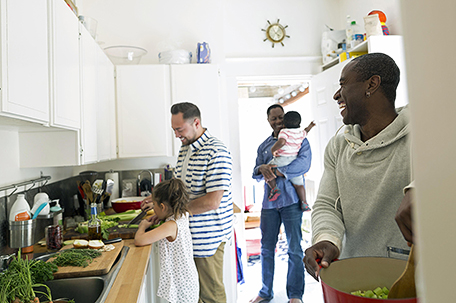
BPT
Good hosts want positive experiences around the dishes they prepare for the holidays – great conversation and good memories.
What’s a sure way to mar the feast? Not being consistent in following safe food handling techniques that every home cook should know. Each year, one in six people experiences food poisoning, affecting some 48 million people, according to the Centers for Disease Control and Prevention (CDC).
“Sometimes, the causes of food poisoning are beyond our control, in spite of regulations and best practices by farmers and food companies. While ready-to-eat foods and restaurants are often highlighted in the fight against food poisoning, we often overlook that home cooks are important partners in reducing the risk of foodborne illness,” said Mike Robach, vice president of food safety at Cargill.
“The most common foodborne pathogens, like salmonella and campylobacter, can cause serious illness, particularly in young children, the elderly, pregnant women and other immune-compromised people,” said Shelley Feist, executive director of the Partnership for Food Safety Education. “Consistently practicing good hand hygiene and safe food handling at home is important to protect your family from these microorganisms and the serious illness they can cause.”
Each year, foodborne illnesses lead to 128,000 hospitalizations and 3,000 deaths, according to the CDC, as they can lead to serious conditions such as sepsis and kidney failure.
Like any skilled chef, you are best prepared to create a memorable feast when you keep these safe food handling practices top-of-mind. They are just as necessary to a great meal as sharp knives, high-quality cookware, fresh ingredients and the right appliances.
Clean hands and surfaces often
Before you begin cooking, start by making sure your work area and tools are clean. Wash all preparation surfaces, including cutting boards, with hot, soapy water. If any tools or containers you will need are dirty, either run the dishwasher cycle or hand-wash the items in a sink of hot, soapy water. Finally, wash your hands with warm water and soap for 20 seconds before and after handling food.
Rinse fresh fruits and vegetables
Depending on what you are using, some foods will require rinsing. Rinse fresh fruits and vegetables under running water just before eating or using. Firm-skinned produce like cucumbers and apples should be rubbed under running tap water by hand or with a clean brush. You should also rinse any produce that will be peeled, because microorganisms on the surface can be easily transferred to the flesh with a peeler or knife blade. Blot fresh fruits and vegetables dry with paper towels.
There is no need to rinse raw meat or poultry, at least, not in the name of food safety. All that will accomplish is potentially spreading bacteria in your sink and beyond. Raw meat and poultry must be cooked to a safe internal temperature.
Safely handle meat and poultry
The best home cooks know it’s important to safely handle raw meat and poultry. To start with, do not thaw frozen meat and poultry at room temperature – to do so gives harmful bacteria an ideal environment to multiply and spread.
There are three safe ways to defrost food: in the refrigerator, submerged in cold water, and in the microwave. Food thawed in cold water or in the microwave should be cooked immediately.
Keep raw meat and poultry separate from other foods, and use one cutting board for fresh produce and a separate one for raw meat and poultry.
And it is worth a reminder – never place cooked food on a plate that previously held raw or undercooked meat or poultry.
Cook to safe temperatures
Here is a compelling reason to cook food to a safe temperature: Even a professional chef cannot say with precision if a food item is cooked to a safe internal temperature. Food is safely cooked when it reaches a high enough internal temperature to kill the harmful bacteria that cause illness. Get a food thermometer and use it consistently. For a list of safe internal temperatures, visit the Partnership for Food Safety Education website at fightbac.org.
Safe leftovers
Proper storing of leftovers in a refrigerator at 40 degrees Fahrenheit or below helps reduce the risk of food poisoning. Keep leftovers in shallow containers so they cool off more quickly. When reheating leftovers, make sure they reach a safe temperature of 165 F degrees as measured with a food thermometer. Consume or freeze refrigerated leftovers within three to four days.
For more tips to build your skills and expertise in food safety, visit StoryofYourDinner.org. Check out an animated video, as well as fun items such as kid-friendly placemats to download, and a collection of delicious side dish recipes that incorporate home food safety tips.

















Leave a Comment